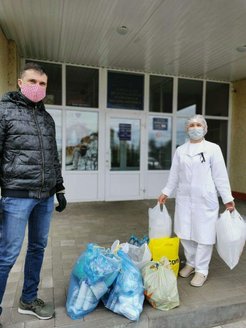Living in a parallel universe: the Belarusian response to the pandemic
Author: Katerina Ivanova
As many European countries begin to re-open shops and restaurants after the pandemic shutdown, about 15,000 people assembled in Minsk for the Victory Day military parade on the 9th of May. At a first glance, it might seem that the whole country has gone insane. President Lukashenko has dismissed the threat as a ‘psychosis’ and proposed a number of ‘folk remedies,’(such as vodka) to stop the spread of the virus. Anecdotal portrayals of the Belarusian response in the English-language media have contributed to this image.
In fact, the response of the Belarus public has been rather divided. Since the first case was registered at the end of February, more than 200 IT companies (such as Wargaming and Epam) have switched to home office. Most people, however, could not afford to self-isolate. Teachers and university professors were obliged to turn up for work as usual, despite the high risks, even if Covid-19 cases were registered within the institution.
In the early days of the pandemic, friends and relatives in Minsk expressed the feeling that they were living in two parallel universes. They read in the social media and were told by their friends abroad that they should ‘stay at home.’ On the other hand, they were supposed to go to work, travel in the crowded metro, and frequent cafes and bars that were open as usual.
Contributing to the general chaos, the Ministry of Health was mocked in the independent media and social networks for inconsistencies in reporting new cases, which forced journalists to solve mathematical riddles in order to present approximate data. This improved later. The veracity of the data supplied is, however, doubted by the public. Among the numbers widely considered to be ‘unrealistic’ are the number of deaths and the number of new coronavirus cases. In mid-May the number of cases in Belarus was already over 30,000 (slightly higher than Sweden), while the number of deaths was a mere 171 (compared with 3,698 in Sweden).
The gulf between the state and the people is an aspect of the gradual depoliticisation of the country due to repressive policies under the presidency of Lukashenko during the past 26 years. Following a series of defeats, NGO actors have turned towards more ‘manageable’ everyday problems, such as environmental issues or the preservation of historical monuments. The approach is to focus on smaller steps within the system, rather than attempt to change the system itself (Kovtiak 2020).i
The government’s inadequate response to the pandemic has intensified this trend. Paradoxically, the authoritarian regime has formulated responsibility for health and safety in very individualistic terms: self-isolation and social distancing are framed as matters of personal choice. For example, parents can decide for themselves whether or not to send their children to school. Students are free to decide if they wish to study remotely online, or in the auditorium. Despite the dismissive stance of the government, public transport has gotten emptier, roughly half of the urban population uses facial masks, and bars and restaurants have few customers.ii Responding to this ‘voluntary self-isolation,’ shopping malls have reduced opening hours due to the lack of customers.
Initiatives from below are also conspicuous in hospitals. The campaign #ByCovid19 crowdfunded Belarusian doctors in various ways – from pulse oximeters and respirators to psychological support. People not previously involved with public health provision (they include fitness instructors, top managers, artists and the members of Belarusian diaspora) have been mobilized. Activists had to learn about the respirators and protective gear from scratch: they acquired one of their first batches of equipment from miners in Soligorsk, who use respirators in their work.

Despite its being a key player in the Belarusian Covid-19 response, this initiative emphasizes its apolitical nature and engages in a sort of a diplomatic dance when it comes to dealing with the government and the Ministry of Health. Its members have appeared in state media under the vague term of ‘volunteers,’ without communication of the name of the initiative and account details to solicit donations. Activists are frustrated by this lack of recognition, and they deplore the public celebrations on Easter and Victory Day, which resulted in new spikes of coronavirus cases (admitted in the official data). However, the initiative has to stay apolitical if it is to survive, for its legal status is extremely precarious. Volunteering is not regulated by law in Belarus, but activists fear that a new law might constrain their activity.
With presidential elections coming up in August 2020, few citizens believe in the possibility of change. The seemingly parallel existence of the ‘state’ and ‘the people’ underpins the political absenteeism of the population. But this does not mean that ‘ordinary people’ are entirely devoid of agency.
Notes
i Kovtiak, Elisabeth. ‘Depoliticising Belarus: Transformation of Civic Activism before and after 2010.’ Lecture in the course ‘Belarus and Ukraine: Historical Trajectories and Post-Soviet Transformations,’ Europa-Universität Viadrina, Frankfurt (Oder), 13 May 2020.
ii How do the residents of Belarus respond to coronavirus? Study by Satio/Beroc. (https://satio.by/novosti/issledovaniecoronavirus2volna/ ) (accessed 22.05.2020)
